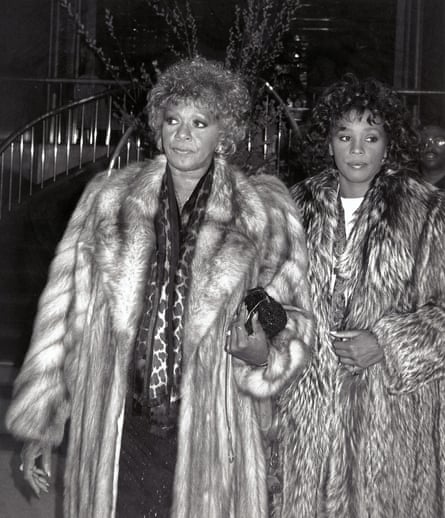The career of the American singer Cissy Houston, who has died aged 91, exemplified the vital force underlying so much modern popular music: the close relationship between African-American sacred and secular idioms, specifically the influence seeping from Black gospel music, with its deep emotional roots and eruptions of ecstatic fervour, into the fabric of R&B, soul and pop.
Houston spent 30 years as the “minister of music” at the New Hope Baptist Church in her native Newark, New Jersey. But she also sang, often with her nieces Dionne and Dee Dee Warwick, on many of the great pop hits of the 1960s and 70s, from the Drifters’ On Broadway through Van Morrison’s Brown Eyed Girl, Aretha Franklin’s (You Make Me Feel Like a) Natural Woman, Dusty Springfield’s Son of a Preacher Man and Paul Simon’s Mother and Child Reunion to David Bowie’s Young Americans.
As a founder member of a vocal group known as the Sweet Inspirations, she toured and recorded with Elvis Presley. After leaving the group in 1970 to raise her family, she pursued a solo career, recording albums and appearing in New York night clubs, which reached its peak with two Grammy awards for her traditional gospel albums Face to Face in 1997 and He Leadeth Me the following year.
She also became known as the mother of the singer Whitney Houston, whose enormous worldwide success, following her appearance in the 1992 film The Bodyguard, attracted attention to a private life that included a turbulent marriage to the singer Bobby Brown and problems with drug addiction.

Whitney, who had begun her singing career under her mother’s tutelage in the New Hope choir, was found dead in the bath of a Beverly Hills hotel in 2012, aged 48. Three years later Whitney’s daughter Bobbi Kristina Brown, a singer and reality TV personality, died after being discovered in similar circumstances, aged 22.
Cissy Houston was born Emily Drinkard, the eighth and last child of Delia Mae (nee McCaskill) and Nitcholas “Nitch” Drinkard, natives of Georgia who moved to New Jersey in the 1920s. Delia died when Cissy – a childhood nickname that stuck – was eight, followed 10 years later by her husband. Cissy went to live with her married older sister, Lee Warrick, whose children included Dionne and Dee Dee, both only a handful of years younger than their aunt.
Virtually from infancy Cissy and her brothers and sisters had been encouraged by their parents to sing in church. They formed a vocal group, into which Cissy was enrolled when she was five. “I used to get so mad,” she told Rolling Stone magazine in 1978. “We’d be out playing in the sun with the other kids and my older sister, Marie, would make us come in for rehearsal.”
The Drinkard Singers achieved national renown, eventually appearing at Carnegie Hall and the Newport Folk festival. In 1954 Cissy took charge of the New Hope choir, which increased from 15 to 60 voices during her years in charge.
A first marriage in 1955 to Freddie Garland brought her a son, Gary, but ended in divorce. In 1964 she married John Houston, an army veteran who became her manager and with whom she had two children, Michael and Whitney.
By the time the second marriage brought her a change of surname, she was working regularly as a backing singer on pop recording sessions, in demand for her three-octave range. With the two Warrick sisters (who would alter their spelling to Warwick) and a friend, Doris Troy, she formed a unit that was soon busy in New York studios providing backing vocals on hits by Solomon Burke, Chuck Jackson and many others.
When all three of her colleagues left to pursue solo careers, she replaced them with Estelle Brown, Sylvia Shemwell and Myrna Smith. Among their regular employers was the Atlantic Records producer Jerry Wexler, who recruited them for sessions with Franklin, with Cissy providing the coloratura soprano flourishes featured on Franklin’s Ain’t No Way in 1968. Wexler also gave them their name, which formed the title of their most successful single, Sweet Inspiration, a top 20 hit when released on Atlantic in 1967.
While bringing up her children, Cissy continued to record and make occasional appearances. Although she made several solo albums for a variety of labels and producers, she was never able to match the solo successes in the pop charts of the Warwick sisters or Troy. But when Burt Bacharach recorded his own versions of some of his greatest hits in 1971, he chose her to sing One Less Bell to Answer, Mexican Divorce and All Kinds of People. In 1976 she was featured in Gospel Fuse, a gospel opera composed by Carman Moore and performed with the San Francisco Symphony orchestra, conducted by Seiji Ozawa.
On the 1989 album Whitney, which would sell more than 20m copies around the world, she joined her daughter for a duet on I Know Him So Well, from the musical Chess. In 1992 she and Jackson were reunited for a fine R&B album titled I’ll Take Care of You. By the time she achieved her Grammy gospel successes, secular music was occupying less of her time, although in 2006 she, Whitney and Dionne Warwick recorded a song called Family First for the Hollywood rom-com Daddy’s Little Girls.
In 1998 she published her autobiography, How Sweet the Sound. Fifteen years later, in Remembering Whitney, she told the harrowing story of her long but unavailing struggle to help her daughter overcome her various problems.
Both her marriages ended in divorce. She is survived by her two sons, six grandchildren and nine great-grandchildren.
